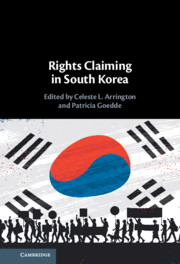Book contents
- Rights Claiming in South Korea
- Rights Claiming in South Korea
- Copyright page
- Dedication
- Contents
- Contributors
- Acknowledgments
- Abbreviations
- Introduction Rights in Action
- Part I Rights in Historical Perspective
- Part II Institutional Mechanisms for Rights Claiming
- 4 A Clash of Claims
- 5 Advancing Human Rights, Advancing a Nation
- 6 The Constitutional Court as a Facilitator of Fundamental Rights Claiming in South Korea, 1988–2018
- 7 Rights Claiming through the Courts
- 8 Public Interest Lawyering in South Korea
- Part III Mobilizing Rights for the Marginalized
- Part IV Shaping Rights for New Citizens and Noncitizens
- Conclusion Findings and Future Directions
- Index
- References
6 - The Constitutional Court as a Facilitator of Fundamental Rights Claiming in South Korea, 1988–2018
from Part II - Institutional Mechanisms for Rights Claiming
Published online by Cambridge University Press: 17 April 2021
- Rights Claiming in South Korea
- Rights Claiming in South Korea
- Copyright page
- Dedication
- Contents
- Contributors
- Acknowledgments
- Abbreviations
- Introduction Rights in Action
- Part I Rights in Historical Perspective
- Part II Institutional Mechanisms for Rights Claiming
- 4 A Clash of Claims
- 5 Advancing Human Rights, Advancing a Nation
- 6 The Constitutional Court as a Facilitator of Fundamental Rights Claiming in South Korea, 1988–2018
- 7 Rights Claiming through the Courts
- 8 Public Interest Lawyering in South Korea
- Part III Mobilizing Rights for the Marginalized
- Part IV Shaping Rights for New Citizens and Noncitizens
- Conclusion Findings and Future Directions
- Index
- References
Summary
This chapter investigates how South Korean citizens’ petitioning to redress grievances against the state and constitutional adjudication have developed since the end of the 1980s. While de jure there existed a constitutional review system since the founding of the Republic in 1948, it was only after transition to formal democracy that infringement on fundamental rights could be de facto appealed in the Constitutional Court, which was established in 1988. Through an analysis of caseload statistics from the Constitutional Court, the chapter explores how citizens have been making use of the constitutional appeal system for claiming their rights. The study also qualitatively examines shifts in the logic and outcomes of constitutional adjudication of fundamental rights claims concerning major social issues such as gender equality, sexual autonomy, and freedom of conscience.
Keywords
- Type
- Chapter
- Information
- Rights Claiming in South Korea , pp. 126 - 150Publisher: Cambridge University PressPrint publication year: 2021



